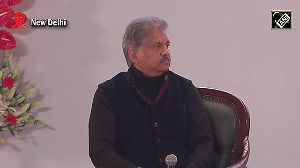The Delhi Jal Board announced last week that it would be forced to shut its water purification systems for a day. The reason was that tanneries in Haryana had released so many pollutants into the Yamuna that the machinery would choke if it tried to cleanse the water. It was a small reminder to Delhiites of what awaits them in summer. And it was also a warning, if anyone chose to heed it, of the utter lack of cooperation between states when it comes to sharing a resource as important as water.
It is this -- the selfishness of individual states -- which leaves me sceptical when someone brings up the issue of sharing waters. Every state approves of the idea on principle provided, that is, that it is somebody else who is being asked to share. Every state will provide statistics to 'prove' that it is actually water-deficient. So, let us have few illusions about the special body, chaired by Suresh Prabhu, which the Government of India has established to carry out the Supreme Court directive on linking river waters. Prabhu is an excellent administrator with a superb record in the Union power
ministry behind him, but knocking heads all over India may prove too much for him, even with the Supreme Court and the prime minister behind him.
But the issue sent me back to the history books. If linking river waters is such a good idea -- and there is a certain inescapable logic to it admittedly -- why has it never been discussed before? The answer is that it has come up at odd intervals, but there always seem to have been good reasons to shelve it temporarily.
As far as I can tell, the earliest proponent in modern times was the 19th century British engineer Arthur Cotton. The then governor general, Lord Dalhousie, was enthusiastic. Unfortunately, it was just about that time that the first railway boom was ending in England, and investors were looking elsewhere for returns. India, with its captive market, seemed the natural place. So Cotton's scheme for a giant series of linked canals was shelved though canals would have carried a greater volume of goods at cheaper rates. However, a colonised India had no answer to England's commercial
interests. (There was an attempt to carry out the scheme at least in South India, but it never really took off.)
The canal scheme was revived nine decades later, in 1945. Everyone sensed that India was on the threshold of Independence, and the more enterprising men of the time were busy drawing up plans to restore the Indian economy to its ancient glory. One of these was Captain Dinshaw J. Dastur, an engineer who was also a trained pilot. His plans were impressive enough that friends, notably Homi Bhabha, got him an introduction to Jawaharlal Nehru. But post-Partition India was obviously not as hopeful a place as it had been just three years earlier, and the scheme was shelved.
Thirty years later, the Morarji Desai government revived the Dastur plan. The Government of India was enthusiastic enough that it approached the Food & Agriculture Organisation in Rome to examine the proposed project. Ninety experts from all over the world scrutinised the plans, and approved of them. Unfortunately, by then the Desai
ministry had lost power -- and the linking scheme was again forgotten.
Captain Dastur is over ninety today, but he is delighted that his decades-old scheme is once again being dusted off. But, he warns all enthusiasts, his scheme is not necessarily what the Government of India means when it speaks of linking major rivers. What the old engineer insists on is the "total control of all river waters." I am not sure where the fine technical differences lie, but I understand there is quite a debate going on behind the scenes between the
'Garland School' favoured by Captain Dastur and the 'Gravity Link School.'
Some figures were mentioned in the Supreme Court. If memory serves me correctly, the scheme -- whichever plan is adopted -- will require nothing less than Rs 550,000 crore at today's money values! Small wonder if there is a spirited debate on which plan to use.
"Nature will tolerate conservation of water," Captain Dastur says, "but not joining of rivers in the plains." It is for the experts to rule on that, but the enthusiasm of this 91-year-old man is definitely contagious. Win or lose, I hope the politicians and bureaucrats don't pour cold water on the scheme once again.






 © 2025
© 2025